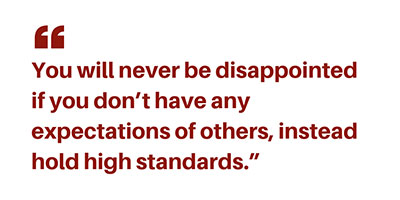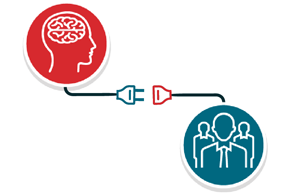For years, a clear plastic bottle sat on my bathroom counter that contained orange tablets that would disappear slowly from the bottle with each passing morning. Multivitamins. Something that, presumably, we’ve all taken.
I did this without question for many years, influenced by my family. It had become a habit. And why not? In a strange way, taking a multivitamin had become as American as apple pie, a staple in the morning routine of many friends and family—from my mom to my next door neighbor Jim. So when I first saw data that suggested that multivitamins don’t actually help prevent cancer, heart disease, or death, it didn’t alter my behavior because, by that time, the vitamin habit was ingrained in my daily routine. Over time, I would come across this information again—as well as other studies pointing to the same evidence. I finally did stop taking vitamins (except for fish oil) after more than a year of seeing numerous articles documenting the data.
When scientific data doesn’t match our personal beliefs, it’s difficult for many of us to change the way we think and behave, and likewise, the way speakers teach. While the Pharma industry has been incredibly successful for decades in changing behaviors based on scientific or clinical evidence, improvements are still needed. Healthcare professionals (HCPs) don’t always make decisions based on data because their emotions often get in the way. This is a fact. This happens to all of us every day in many ways. Virtual speaker training allows for repetitive training of clear evidence and, due to its low cost in the field of medical education, it should be a part of every Speakers Bureau.
In my experience, HCPs make prescribing decisions just as often based on emotional and social factors than on what the data show. We are greatly influenced by what our gut tells us and by what others are saying to us than we are by what the actual data show. So why are we training our speakers only once a year with live training when we know how important repetition is? Wouldn’t it be better to offer training that’s gaited throughout the year and delivered virtually instead? Virtual training makes sense for instilling new clinical science. HCPs are your educators and they are busy. They forget the nuances of the products that they are discussing. Once they attend a live training meeting, their beliefs change for a period of time, but like muscle memory, without repetition these beliefs don’t translate into action and speakers often revert back to their old ways of teaching and advising. My Latin teacher, Fr. Gene Ulses, drilled into me, “Repetitio est mater studiorum” which means, “Repetition is the mother of studies.”
Click the video above for a story about a real instance in which a doctor was able to overcome emotional obstacles in her prescribing habits after repeated exposure to logic and data.
The best way to understand this phenomenon is to look at real data based on human behavior. Let’s take a look at the multivitamin example that I mentioned earlier. The Annals of Internal Medicine reviewed three large trials on the use of multivitamins and 24 trials of single or combined vitamins involving over 400,000 people—a massive study population.1 -3 The conclusion from the first trial showed no convincing evidence that supplements prevent or delay cancer, heart disease, or death.1 The second randomized trial following 5947 men aged ≥65 years for 12 years and found no difference in the mental functioning or verbal memory of those who took a multivitamin versus those that took placebo.2 The third trial compared a high-dose 28-component multivitamin versus placebo in 1708 men and woman who had survived a previous heart attack. After 4.6 years, no difference was seen between the two groups in their subsequent rates of heart attacks or strokes.3
Accompanying the three studies was an editorial note, “Evidence involving tens of thousands of people randomly assigned in many clinical trials shows that beta-carotene, vitamin E, and possibly high doses of vitamin A supplements increase mortality and other antioxidants, folic acid and B vitamins, and multivitamin supplements have no clear benefit.”4
This information has been broadcast on the evening news and circulated all over the web since they were first published in 2013. Despite these findings, a 2016 Gallup poll found that 50% of Americans say they that regularly take vitamins or mineral supplements.5 And the more educated consumers are, the more likely they are to use these same vitamins that have demonstrated no clear health benefit. In fact, 65% of people with a postgraduate education take vitamins.5 Smart people take actions that don’t always make sense.
The point is that sometimes we see and hear things that are logical. They may make good sense, but if they contradict our habits or our preconceptions, the emotional elements related to a behavior can have more of an impact on our actions. A way to overcome these emotional ties to behavior is through repeating a break in the logic. Repeating the logic can, in fact, help someone overcome behavior that is emotionally driven.
It takes repetition and time for people to change behaviors. With persistence, change will happen. Virtual speaker training allows for repetitive training due to its low cost in the field of medical education and should be a part of every Speakers Bureau for this reason alone. Isn’t it time for your organization to consider some changes?
References
- Fortmann SP, Burda BU, Senger CA, Lin JS, Whitlock EP. Vitamin and mineral supplements in the primary prevention of cardiovascular disease and cancer: an updated systematic evidence review for the U.S. Preventive Services Task Force. Ann Intern Med. 2013;159(12):824-834.
- Grodstein F, O’Brien J, Kang JH et al. Long-term multivitamin supplementation and cognitive function in men: a randomized trial. Ann Intern Med. 2013;159(12):806-814.
- Lamas GA, Boineau R, Goertz C, for the TACT (Trial to Assess Chelation Therapy) Investigators. Oral high-dose multivitamins and minerals after myocardial infarction: a randomized trial. Ann Intern Med. 2013;159(12):797-805.
- Guallar E, Stranges S, Mulrow C, Appel LJ. Enough is enough: stop wasting money on vitamin and mineral supplements. Annals Intern Med. 2013;159:850-851.
- Gallup.com. Half of Americans take vitamins regularly. https://news.gallup.com/poll/166541/half-americans-vitamins-regularly.aspx. Accessed August 8, 2018.





